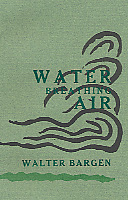Timberline Press, 51 pages, 1999
Out of print.
[reveal heading=”%image% Selection”]
MAP TO THE PARTY
IF you wait, you grow old, nothing
more. Traveling light is your only
illuminating illusion.
Either way you can’t remain
time and place inseparable.
To settle is to amass names:
lespedeza, hickory, Providence Road.
To accelerate is to compress
latitude and longitude,
to shoulder wind in every
direction, to wear a hole
in the already worn cartography.
To grow old is to grasp sheer
granite faces, to negotiate
declivities and eruptions
of aspiration, to disbelieve
coded legends, to find instead
water’s divides, to follow the rule
of thumb-civilization’s always
down stream a steaming ruin,
a crumbling repository, a flow,
a seepage, the final flush
to sea level and lower. Buried in
the alluvium: Etruscan bronzes,
eroding pyramids coral-encrusted
hub caps, cracked glass fishing
floats. On an oil-blackened spit
the aging Archimedian rabble
gathers to count the grains
again, praying for a mistake.
[/reveal]
[reveal heading=”%image% Reviews”]
Water Breathing Air is the fifth collection of poetry by Bargen, whose poem “The Good Red Rose” won the 1995 St. Louis Poetry Center open competition. The poems in his latest offering often begin with a joyful moment that is that is quickly juxtaposed with a jolt of reality, such as an accident , an argument or one of his recurring images, a flood. The canvas of his writing is scarred with the effects of modern industry and the betrayal of nature by man, and images of nature’s resistance run like a current through this collection.
“Sorting Snapshots” is a more contemporary poem in which the narrator is overwhelmed by memories that remain unexplained. Memories, like water swell and overflow, and they can dilute the very meaning of what they represent.
The poem reaches an epiphany by revealing the narrators underlying desire to preserve memories. Camped on the floor, surrounded by photographs, the narrator is determined to put them in an album. But the narrator is invaded by the very memories and can’t go through with the cutting and trimming:
“What’s cut away
is the peripheral and its edges, thin
strips of the unnecessary, the clutter that obscures the borders and blinds
the focus.”
The narrator feels guilty discarding unworthy moments and falters. Finishing the job would mean sacrificing the insignificant, and looking back, the narrator realizes it was at those moments that the mind was free and unburdened. In the future, as Bargen artfully depicts, we’ll be no more remembered than the background faces in a photograph.
“And then there’s
the overexposed, the double exposed,
and the underexposed; it’s all the avoidable
accidents and the way we edit our lives;
what we must forget, the litter of vision that
swells and turns all our faces to backgrounds.”
Bargen’s poems speak in the language of water but his reflections don’t dampen the human spirit. Rather, his images -floating on the waves of hope and possibility-can inspire and rejuvenate.
[/reveal]
